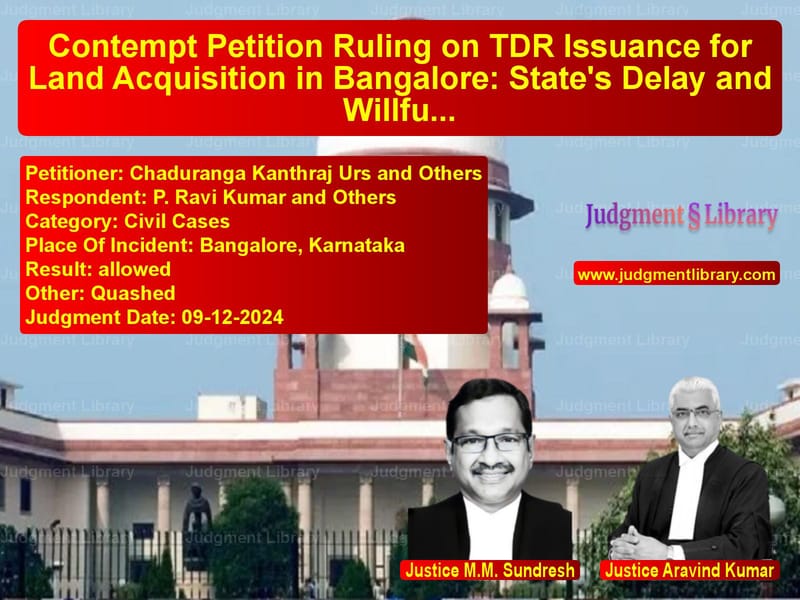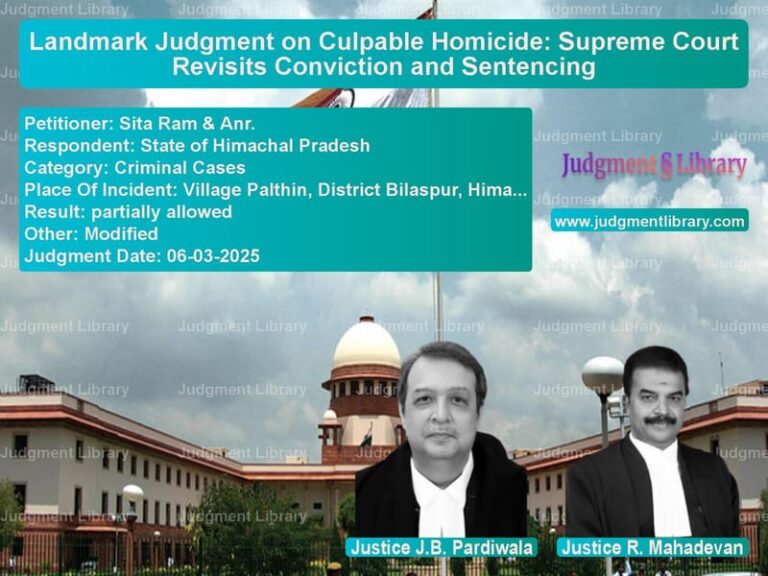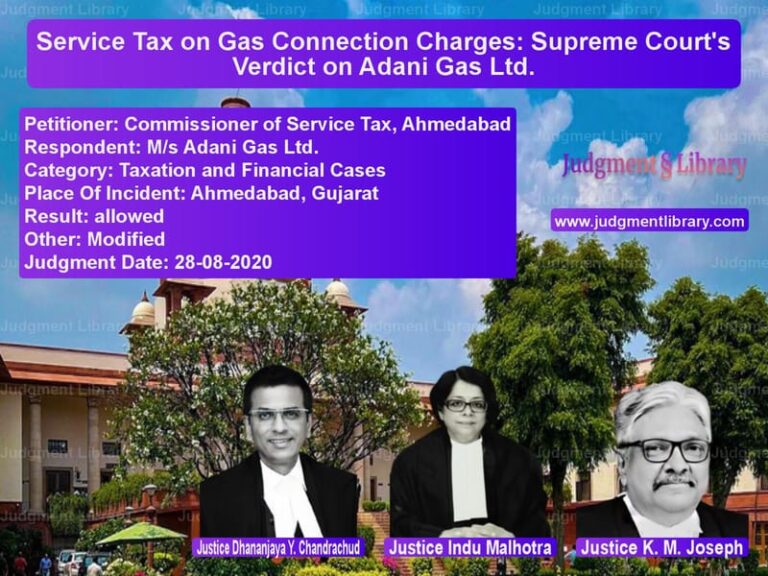Contempt Petition Ruling on TDR Issuance for Land Acquisition in Bangalore: State’s Delay and Willful Disobedience
The Supreme Court of India, in the case of Chaduranga Kanthraj Urs and Others vs. P. Ravi Kumar and Others, delivered a significant judgment on December 10, 2024, regarding the implementation of orders passed for the issuance of Transferable Development Rights (TDR) to landowners whose land had been acquired for road widening purposes in Bangalore. This ruling primarily deals with the alleged wilful disobedience of the Court’s directions by the Karnataka state authorities and the delay in issuing TDR certificates in favor of the landowners. The Court’s decision highlights the importance of upholding the Court’s dignity and implementing its orders promptly.
Background of the Case
The case stemmed from the acquisition of 15 acres and 39 guntas of land in Bangalore for the widening of Bellary and Jayamahal Roads. The acquisition was carried out under the Karnataka Town and Country Planning (KTCP) Act, 1961. The petitioners, whose lands were acquired, were to receive TDR certificates in compensation for their land, as per the Karnataka Town and Country Planning (Benefit of Development Rights) Rules, 2016. However, despite multiple directions issued by the Court, the respondents (state authorities) failed to comply with the orders, leading to the filing of contempt petitions.
Initially, the Karnataka state authorities, including the Bengaluru Development Authority (BDA) and Bengaluru Bruhat Mahanagara Palike (BBMP), were ordered to issue TDR certificates to the landowners as per the applicable rules. The orders were issued by the Court on 21st November 2014 and 17th May 2022, but the authorities failed to implement them. Despite multiple opportunities and deadlines set by the Court, the respondents continued to delay the issuance of TDR certificates, claiming financial hardship and other reasons for their inaction.
Legal Issues Raised
- Whether the respondents’ failure to comply with the Court’s orders constituted wilful disobedience of the Court’s directions.
- Whether the respondents had a genuine difficulty in issuing the TDR certificates or if their actions were deliberate and aimed at undermining the Court’s authority.
- Whether the State of Karnataka and its authorities can be held accountable for the delay in issuing TDR certificates despite several judicial orders for compliance.
Arguments Presented
Arguments by the Petitioners
- The petitioners argued that the state authorities had wilfully disobeyed the Court’s orders, which were clear and unambiguous, by failing to issue TDR certificates as per the TDR Rules.
- The petitioners contended that the state had not provided any valid justification for the delay and that financial hardship cited by the state was not a valid excuse for non-compliance.
- They also argued that despite the State having benefited from the land acquired for road widening, it had not taken appropriate steps to compensate the landowners, as ordered by the Court.
- Furthermore, the petitioners claimed that the respondents were attempting to overreach the orders by seeking to modify the original directions after several years, which was an abuse of the legal process.
Arguments by the Respondents
- The respondents, representing the state authorities, argued that there had been no wilful disobedience and that efforts were made to comply with the Court’s orders. However, due to certain challenges, such as the financial burden on the State, there were delays in issuing TDR certificates.
- The respondents also pointed to the actions taken to issue TDR certificates after multiple notifications and meetings were held between the State and the landowners. They claimed that despite the delay, they were making genuine efforts to comply with the Court’s directions.
- The respondents further stated that any delays were due to procedural issues, including the issuance of necessary notices and documentation, and not out of any intention to defy the Court’s orders.
Supreme Court’s Observations
On Wilful Disobedience of the Court’s Orders
The Supreme Court first addressed the issue of whether the respondents had wilfully disobeyed the Court’s orders. The Court observed that:
“Wilful disobedience refers to an intentional, calculated, and deliberate failure to comply with the Court’s directions. In this case, despite clear and explicit directions, the respondents failed to take timely action to issue the TDR certificates. The delays were not accidental but intentional, demonstrating a disregard for the authority of the Court.”
On the Failure to Implement the Orders
The Court further emphasized that there was no genuine difficulty in implementing the Court’s orders, especially after the issuance of several orders between 2014 and 2024. The Court stated:
“The respondents had more than sufficient time to comply with the directions of this Court. There were no substantial justifications provided for the delay, and their actions in seeking modifications of the order after seven years further demonstrated their lack of commitment to implementing the Court’s orders.”
On the State’s Attempt to Modify the Order
The Court noted that the state’s attempt to modify the order after several years was not only an abuse of the legal process but also a delay tactic. The Court pointed out:
“The filing of I.A. No. 98276 of 2021 for modification of the order dated 21.11.2014, after seven years, is an indication that the respondents did not intend to comply with the original order. The attempt to modify the order is nothing but a ploy to delay the issuance of TDR certificates and to undermine the authority of this Court.”
Final Verdict
- The Supreme Court held that the respondents were guilty of wilfully disobeying the orders of the Court and had failed to implement them in a timely manner.
- The Court directed the respondents to issue the TDR certificates as per the prevailing TDR Rules, based on the market value fixed under Section 45B of the Karnataka Stamp Act, within six weeks from the date of the order.
- The Court also imposed a cost of ₹1 lakh each on the respondents for their failure to comply with the orders, except for the complainant in C.P. No. 578 of 2022.
- The Court emphasized that the respondents’ actions had undermined the dignity and authority of the Court and had caused unnecessary delays in the implementation of the Court’s orders.
Implications of the Judgment
- Accountability of State Authorities: The ruling reinforces the need for state authorities to act promptly in compliance with Court orders and highlights the consequences of willful disobedience.
- Strengthening Court’s Authority: The judgment serves as a reminder of the judiciary’s role in enforcing its orders and ensuring that the rule of law is upheld without exception.
- Deterrence against Delay Tactics: The ruling sends a strong message that delay tactics, such as seeking modification of orders years after they have been passed, will not be tolerated.
- Fair Compensation for Landowners: The judgment also ensures that landowners whose land was acquired for public purposes receive fair compensation in accordance with the Court’s orders, thereby safeguarding their rights.
The Supreme Court’s judgment is a critical step in ensuring that government authorities comply with judicial orders and that landowners are compensated fairly for the land acquired for public use. It underscores the importance of the rule of law and the need for timely and transparent execution of Court orders.
Petitioner Name: Chaduranga Kanthraj Urs and Others.Respondent Name: P. Ravi Kumar and Others.Judgment By: Justice M.M. Sundresh, Justice Aravind Kumar.Place Of Incident: Bangalore, Karnataka.Judgment Date: 09-12-2024.
Don’t miss out on the full details! Download the complete judgment in PDF format below and gain valuable insights instantly!
Download Judgment: chaduranga-kanthraj-vs-p.-ravi-kumar-and-ot-supreme-court-of-india-judgment-dated-09-12-2024.pdf
Directly Download Judgment: Directly download this Judgment
See all petitions in Contract Disputes
See all petitions in Property Disputes
See all petitions in Specific Performance
See all petitions in Judgment by M.M. Sundresh
See all petitions in Judgment by Aravind Kumar
See all petitions in allowed
See all petitions in Quashed
See all petitions in supreme court of India judgments December 2024
See all petitions in 2024 judgments
See all posts in Civil Cases Category
See all allowed petitions in Civil Cases Category
See all Dismissed petitions in Civil Cases Category
See all partially allowed petitions in Civil Cases Category







